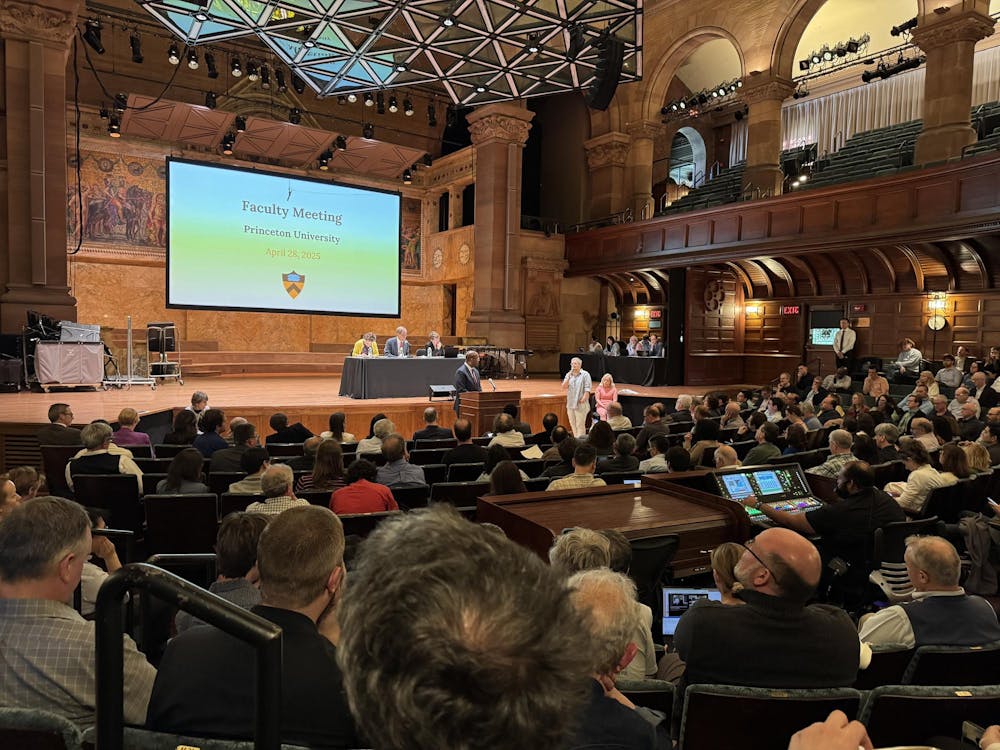Princeton University faculty can only vote on proposals that are “actionable within the context of university operations,” not those simply expressing political positions or beliefs, after a vote at the faculty meeting on April 28.
Hundreds of faculty members filled the entire lower section of Alexander Hall in Richardson Auditorium for the vote. Ultimately, an overwhelming majority of faculty members supported the passing of the following amendment to Section II.C.2 of the Rules and Procedures of the Faculty, introduced by the Ad-hoc Committee on Faculty-Wide Statements:
“Proposals presented at faculty meetings for a vote of the faculty must be actionable within the context of university operations, i.e., they must propose a policy change or other action consistent with the authority delegated to the faculty — or recommend such actions be considered by university members with relevant delegated authority — beyond statements expressing a position or belief.”
A few dozen faculty members opposed the amendment.
An amendment to prohibit faculty members from issuing faculty-wide political statements was originally proposed at the Oct. 2024 faculty meeting by Politics and School of Public and International Affairs (SPIA) professor Jonathan Mummolo. Mummolo is a co-chair of the Princeton Council on Academic Freedom (PCAF), whose members support institutional neutrality and do not support faculty-wide political statements.
The Oct. 2024 proposal, however, was different reading, “The faculty shall not vote on the issuing of collective political or ideological statements or on recommendations for other collective political or ideological actions unrelated to the faculty’s sphere of governance.” The amendment that passed instead stresses that any proposals that are passed must be “actionable,” and cannot merely express positions or beliefs.
“[Actionable] was the word that was found which could bridge what the faculty would be voting on, and what they would be asking for with their vote,” said Associate Professor of Classics and co-chair of PCAF Emmanuel Bourbouhakis.
At the Oct. 2024 faculty meeting, faculty members had voted to postpone the vote on faculty-wide statements, instead electing to form the Ad-hoc Committee on Faculty-Wide Statements to study the issue. The committee is chaired by Associate Chair of the Department of Electrical and Computer Engineering Claire Gmachl. Several members of PCAF, including Mummolo, also serve on the committee. According to the committee's report obtained by The Daily Princetonian, its members were selected through an open election held in Dec. 2024.

According to the report, the Ad-hoc Committee conducted a survey sent to 1,141 voting-eligible faculty members and completed by 532, held three town hall meetings, supported 18 departments to discuss this issue at their respective faculty meetings, and created a web portal to allow faculty to express more detailed views. Ultimately, the committee found that 63 percent of faculty members were opposed to faculty-wide statements, 21.25 percent supported faculty-wide statements, and 15.75 percent were not sure of their opinion.
Faculty responses varied notably across disciplines. In a survey asking whether the faculty should “vote during university faculty meetings on collective social or political statements that do not directly concern university functioning or policy,” 50 percent of Humanities faculty opposed such statements compared to 80 percent of Engineering and Applied Science faculty. However, opposition to such statements still outnumbered support across the disciplines, with a little under 30 percent of Humanities faculty supporting such statements and about 20 percent of Humanities faculty answering that they were not sure.
According to the report, the most commonly cited arguments against faculty-wide statements included that they “produce a false impression of consensus,” “purport to speak for the whole faculty,” “threaten academic freedom,” “inhibit or suppress individual speech,” “unduly politicize the faculty and faculty meetings,” and “prove divisive.”
“[Prohibiting faculty-wide statements] will temper some of the potential acrimony at the faculty meetings,” Bourbouhakis said.

By contrast, the most commonly cited arguments in favor of faculty-wide statements, according to the report, included that “faculty have a moral responsibility to take collective positions on certain issues,” “it is not possible to distinguish between what is and what is not directly relevant to university functioning and policy,” “prohibition would curtail the power of the faculty,” “collective speech is a right that should not be relinquished,” and “statements wield influence in the wider world.”
At the faculty meeting, Professor of Electrical and Computer Engineering Mansour Shayegan argued that “it is a mistake for us to isolate ourselves from important national or international current events.”
“I understand that we can each express our own views individually or sign statements, but our collective voice, collective voice as a faculty, is precious and can be very effective,” He recounted how, following President Jimmy Carter’s 1980 order to expel all Iranian students from the United States during the Iran hostage crisis, faculty-wide statements issued by universities played a key role in reversing the policy, which allowed him to complete his Ph.D.
Dayton-Stockton Professor of History Gyan Prakash went even further, telling the ‘Prince’ that “the faculty have basically voted to abdicate their role in any governance of the University.”
At the meeting, Prakash also said that “this recommendation comes against the background of the genocide in Gaza, and it’s clearly an attempt to prevent the faculty to say anything about it.”
More recently, a faculty-wide statement was proposed in May 2024 stating “That we, the Faculty of Princeton University, call for an immediate and permanent ceasefire in Gaza, and condemn Israel’s genocidal campaign against the Palestinian people.” This proposal was not voted on to be passed.
Responding to Prakash, Professor in Engineering and Applied Science Antoine Kahn said that “[Prakash’s] comment [about Gaza] … is so controversial that it is exactly what this faculty should avoid.”
Politics and SPIA professor Andy Guess said he wanted to “hold off” on making a blanket prohibition on faculty-wide statements. In light of the Trump administration’s current attacks on higher education, Guess stated that “any issue can become politicized in a way that’s really difficult to anticipate.”
He added that “any instance in which the faculty would be asked to kind of collectively debate whether to make a big statement will, by definition, be an extraordinary circumstance.”
Guess pointed out that a faculty-wide statement has only been issued once in history, 55 years ago. In May 1970, faculty members voted to adopt a resolution calling for the immediate withdrawal of American troops from Southeast Asia during the Vietnam War.
“Given that,” Guess continued, “I’m very hesitant to say that I think we should relinquish the power to [issue faculty-wide statements].”
Supporters of the proposal, however, argued that it does not diminish faculty governance or the ability of faculty members to address political issues.
“Our amendment does nothing to limit the role of faculty in governance. On the contrary, it makes explicit that faculty can vote on recommendations for policy changes outside the faculty’s authority,” Mummolo wrote in a statement to the ‘Prince.’ “What our amendment says is that when we come together in these meetings, we should vote on actionable decisions about how to run this university. That is the essence of faculty governance.”
Discussing whether or not faculty members could respond, for example, to increasing threats to international students on campus by the Trump administration, Bourbouhakis argued that this issue “clearly falls within the University’s educational mission.” As long as faculty make a proposal that is actionable, for example about legal services or completing degrees long distance, Bourbouhakis said that this would be “within our purview.”
When economics professor Ilyana Kuziemko asked if faculty members could legitimately call on President Eisgruber to lobby the U.S. government, since that is counted as “actionable,” Gmachl said that this would be acceptable.
“I’m genuinely confused,” added history professor Divya Cherian. “The prior debate was about a distinction between political versus governance issues, and it looks to me like you’ve done away with that distinction … you just split the governance question.”
“It looks to me like this proposal actually seems to expand faculty power in that now we can legitimately ask the leadership of the University to take actions that we as a majority want them to take,” Cherian added.
Bourbouhakis admitted that “the new language will eventually be tested. Somebody may bring a proposal that falls within some sort of gray area … [and] maybe another committee will have to be created to study that matter.”
Other postponed items from previous faculty meetings were not reintroduced. At the Oct. 2024 faculty meeting, the Faculty Advisory Committee on Policy (FACP), consisting of six elected tenure or tenure-track faculty members, was asked by Eisgruber to offer guidance on measures which have been postponed since May and Oct. 2024. Six pro-Palestine proposals were initially proposed at the May special faculty meeting held during the “Gaza Solidarity Encampment.” Only one — a non-binding resolution calling for amnesty for student protestors — was narrowly passed.
Postponed items from the Oct. 2024 faculty meeting included proposals calling for the creation of an ad-hoc committee to review the University’s response to pro-Palestine protests in the spring of 2024, as well as the creation of an initiative to support Palestinian, Arab, and Arab-American University community members.
“[The FACP] has produced a report recommending that the President hold most of the referred measures as void,” according to Dean of the Faculty Gene Jarrett at the faculty meeting. Jarrett also referred to a memo from Eisgruber “indicating that he accepts the [FACP’s] recommendation.”
Despite faculty members now having a codified power to vote on actionable proposals, the amendment has removed their ability to issue collective faculty-wide statements expressing beliefs.
“I think most faculty just don’t want to have to think about these issues,” Guess told the ‘Prince,’ “And I think that's understandable, because having contentious debates is exhausting and takes our time away from other things.”
Nikki Han is an assistant News editor and a contributing Features writer for the 'Prince.' She runs the Faculty, Graduate Students, and Alumni coverage area.
Please send any corrections to corrections[at]dailyprincetonian.com.
Correction: This piece has been updated to add more context about the results of the Ad-hoc Committee’s survey and to clarify that faculty members can individually issue whatever statements they wish.








